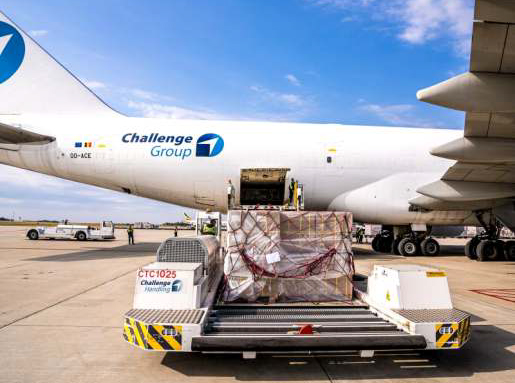Flying Fresh: Handling the World's Perishable Goods Trade
The delivery of perishable commodities is one of the industries that perform a delicate pirouette in the relentless rhythm of global trade. Imagine crates of glistening cherries, hand-picked at the peak of freshness in Chile, arriving crisp and juicy in China days later. Or think of a prized Arabian stallion, carefully crafted and flown across continents to participate in a prestigious competition. The intricate web of logistics and infrastructure that underpins the movement of these time-sensitive treasures is nothing short of awe-inspiring. It’s a symphony of meticulous planning, specialized handling, and rapid transit, all working in concert to ensure these perishables reach their destinations with their integrity and value intact.
Amidst this complex ecosystem, two key players stand out for their expertise and innovation: Challenge Group and Changi Airport. By delving into their insights and capabilities, we can gain a deeper understanding of the nuances and challenges that define the fascinating world of global perishable trade. We’ll explore the strategies employed by these leaders to navigate temperature-controlled environments, streamlined customs clearances, and the ever-evolving demands of this dynamic sector. Through their lens, we’ll gain a richer appreciation for the invisible ballet that keeps the world’s most delicate and delicious cargo moving seamlessly across the globe.
How Challenge Group Masters Perishable Logistics
David Canavan, Chief Operating Officer at Challenge Group, paints a vivid picture of their operations, which are finely tuned to transporting perishable goods. “At Challenge Group, we’ve built our network and our infrastructure around the transportation of perishables,” Canavan asserts confidently. “This specialization has endowed us with a maturity in this area, allowing us to navigate it with relative ease,” he says.
He underscores the company’s robust capabilities, citing its capital capacity, operational prowess, and specialized expertise in the pharma segment. “We are well-equipped to handle the challenges inherent in transporting perishable goods,” Canavan remarks.
Canavan paints a vivid picture of Challenge Group’s diverse operations, highlighting their ability to maintain a delicate balance in transporting perishable goods worldwide. “Whether it’s inbound or outbound, our operations are remarkably balanced,” he explains. “From flowers in Liège to lobster from Canada, we ensure that perishable goods reach their destinations swiftly and efficiently.” From transporting delicate flowers from Liège to Amsterdam to facilitating the movement of seafood from Norway to Asia, Challenge Group’s portfolio is as diverse as it is extensive.
Adapting to Changing Consumer Trends
Canavan acknowledges the shifting landscape brought about by the rise of e-commerce, which has altered consumer behavior and increased demand for perishable products. Reflecting on the impact of e-commerce on perishable markets, Canavan acknowledges the notable shift in consumer behavior, particularly during the pandemic. “We’ve witnessed a significant change in consumer demand for perishable products,” he observes. “From seafood to fruit, there’s been a surge in demand, driven in part by the rise of e-commerce.”
Canavan addresses the challenges and opportunities presented by the exponential growth of e-commerce. “The growth of e-commerce has been staggering, making it difficult to gauge the exact percentage growth of perishable markets,” he notes. “However, it’s evident that perishable trade is moving in the right direction, albeit with its own set of challenges.”
However, he emphasizes that while e-commerce plays a significant role, the final mile delivery is often handled by traditional retail or wholesale organizations. Challenge Group’s focus remains on providing speed, reliability, and security throughout the supply chain, ensuring that perishable goods reach their destination in pristine condition.
Predicted Growth
In terms of growth, Canavan acknowledges the exponential rise of e-commerce but highlights the steady nature of perishable markets. Canavan shares insights into the company’s predicted growth. “While our growth has been steady, we are exploring avenues for further expansion,” he explains. “Whether it’s through introducing new destinations or increasing frequencies to existing ones, we are committed to sustaining growth in the coming years.”
Canavan also discusses the company’s outlook for the future, noting potential expansion into South American markets to capitalize on emerging opportunities. By tapping into new markets and continuously improving their capabilities, Challenge Group aims to remain at the forefront of the perishable trade industry.
Investing in Innovation and Technology
While there’s a constant need to explore new destinations and increase frequencies to meet growing demand, Challenge Group remains committed to leveraging technology to enhance safety and efficiency. “We are investing in technology to enhance the safety and efficiency of our transportation processes,” he reveals. “From end-to-end solutions to track-and-trace systems, technology remains integral to our operations.”
He continues, “For instance, our trucking network out of Liège is growing at exceptionally good rates, with full track-and-trace capabilities. This allows us to have visibility throughout the transportation process, ensuring smooth operations.”
A Look at Changi Airport’s Vision
Jaisey Yip, Vice President of Cargo Business Division at Changi Airport Group, offers acompelling glimpse into the future of perishable trade, particularly in the vibrant landscape of Asia. With a projected population of 5.3 billion consumers by 2050 and a growing middle class, Asia’s appetite for fresh and high-quality perishables is on the rise. From fruits and vegetables to chilled meat and seafood, the demand for these products is fueled by a shift towards healthy eating and lifestyle choices.
Jaisey highlights the significant role air cargo plays in meeting this demand, citing the annual growth rate of temperature-sensitive food produce imports in Asia. Changi Airport, as a pivotal hub in the region, has witnessed a surge in perishable imports, driven by countries like China, South Korea, Thailand, and Vietnam. “We’ve witnessed an exponential growth in the import of temperature-sensitive food produce,” remarks Jaisey. “This growth, primarily driven by countries like China, South Korea, Thailand, and Vietnam, underscores the pivotal role of air cargo in catering to the region’s perishable needs.” The airport’s strategic investments in cold chain infrastructure and partnerships with industry players have bolstered its position as a preferred hub for perishable trade.
The Cold Chain Challenge
“Despite the numerous advantages of transporting perishables by air, such as speed of delivery and extended shelf life, effective cold chain management remains a paramount challenge,” asserts Jaisey. “According to the Food and Agriculture Organisation of the United Nations, approximately 14% of total food produced globally is lost, and an additional 17% is wasted, largely due to inadequate cold chain management practices.”
Recognizing the critical importance of maintaining an unbroken cold chain, Changi Airport has made substantial investments in cold chain infrastructure and equipment. With a combined cargo handlers’ temperature-controlled warehouse annual capacity exceeding 375,000 tons, Changi Airport ensures that perishable goods remain at optimal temperatures throughout their journey within the airport premises.
Changi Airport’s Strategic Investments
“In a significant milestone for the region,” continues Jaisey, “Changi Airport spearheaded the creation of the first IATA CEIV Fresh certified community in Southeast Asia in 2021. Collaborating with industry partners such as dnata Singapore, SATS, and Singapore Airlines, this certification sets baseline standards and compliance measures aimed at preventing food waste throughout the air transportation process.”
Further cementing its commitment to quality in perishable trade, Singapore Airlines launched THRUFRESH, a specialized service designed for the secure transportation of perishables. “Through strategic partnerships with cargo terminal operators and ground handlers across key global hubs,” Jaisey explains, “including Amsterdam, Barcelona, Beijing, Brussels, Frankfurt, Ho Chi Minh City, Hong Kong, Hyderabad, New Delhi, Shanghai, Singapore, and Zurich, THRUFRESH ensures the integrity of perishable shipments at every stage of their journey.”
Changi ACCS
“In 2020,” Jaisey emphasizes, “Changi Airport introduced the Changi Air Cargo Community System (ACCS), a community data-sharing platform designed to promote innovation and collaboration within the cargo handling process. This open ecosystem aggregates data from all parties involved in cargo handling, facilitating increased shipment visibility and operational excellence through the utilization of advanced technologies.”
In conclusion, she underscores Changi Airport’s commitment to end-to-end cold chain management and quality assurance initiatives. “Through strategic investments, industry partnerships, and innovative solutions,” she states, “Changi Airport continues to set the standard for excellence in the transportation of perishable goods, ensuring that they reach their destination with freshness and quality intact.”
Market Analysis and Future Trends
Beyond the insights provided by Challenge Group and Changi Airport, it’s essential to examine broader market trends and future projections in the global perishable trade industry. According to industry reports, the demand for perishable products is expected to continue growing steadily, driven by factors such as population growth, changing consumer preferences, and the rise of e-commerce.
The COVID-19 pandemic has further accelerated the shift towards online shopping, leading to increased demand for perishable goods delivered directly to consumers’ doorsteps. This trend has presented both opportunities and challenges for industry players, as they strive to meet the evolving needs of consumers while ensuring the safety and quality of perishable products during transportation.
In response to these challenges, companies across the perishable trade supply chain are investing heavily in technology and innovation. From blockchain-based tracking systems to AI-driven predictive analytics, these advancements aim to improve visibility, efficiency, and traceability throughout the supply chain, ultimately enhancing the integrity of perishable shipments.
Looking ahead, experts predict continued growth in perishable trade volumes, particularly in regions with rapidly expanding populations and rising disposable incomes. Asia, in particular, is expected to remain a key driver of growth, with its burgeoning middle class fueling demand for fresh and high-quality perishable products.
Perishable commodities transportation is still an essential part of the supply chain as long as global trade keeps changing. With insights from industry leaders like Challenge Group and Changi Airport, along with a comprehensive analysis of market trends and future projections, it’s evident that success in this domain hinges on a combination of expertise, infrastructure, and innovation.
From leveraging technology to ensuring the integrity of cold chain management, these players are at the forefront of shaping the future of perishable trade, ensuring that fresh produce and delicate goods reach consumers around the world, flying fresh every step of the way.














